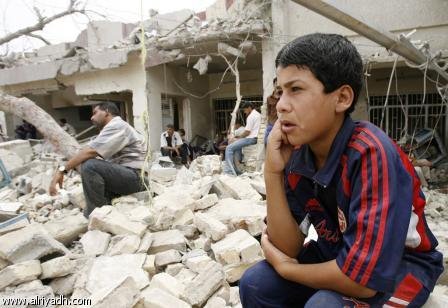Iraqi refugees facing desperate situation
Amnesty International
15 June 2008
"Omar, a 69-year-old refugee from Baghdad, said he will die a 'slow death' if assistance is stopped. He and his family have depended on food and medical assistance since they fled to Syria in 2006." – UNHCR, May 2008. Iraq remains one of the most dangerous places in the world. Its refugee crisis is worsening. According to the United Nations High Commissioner for Refugees (UNHCR), since the US-led invasion of Iraq in March 2003, an estimated 4.7 million have been displaced both within and outside Iraq and for many the situation is desperate. A new report by Amnesty International, Rhetoric and reality: the Iraqi refugee crisis, says that the international community continues to fail to respond to the crisis in a meaningful way. Countries like Jordan and Syria host most of the refugees but are simply not equipped to meet the needs of all those arriving. Syria alone may be hosting more than a million refugees. As of 2007, only 1 percent of the total Iraqi displaced population was estimated to be in the industrialized world. To mark World Refugee Day, Amnesty International has called on the international community and, in particular, those states who participated in the US-led invasion of Iraq, to take real steps to alleviate the suffering of those displaced. The organization said these countries must urgently act on their responsibility to assist the host nations and humanitarian organizations operating in the region to support the large numbers of refugees. "Many refugees are finding it difficult to survive," said Philip Luther, Deputy Director of Amnesty International's Middle East and North Africa Programme. "They are banned from working and unable to pay rents, buy adequate food for themselves and their families, or obtain medical treatment. Those lucky enough to escape Iraq rely on savings which, for many, are rapidly running out." Many families are destitute and facing impossible choices and new risks, like having to resort to child labour and the prospect of being forced through circumstances to undertake "voluntary" return to Iraq.Humanitarian agencies cannot cope with growing demands as more refugees need help with the basics to survive. The UNHCR had planned that by the end of the year it would be distributing food to around 300,000 people in Syria alone. However, the agency recently announced that inadequate funding means that, by August 2008, it will not be able to "cover all basic health needs of Iraqis, and many serious and chronically ill Iraqis will not be able to receive their monthly medication." Current food aid for 150,000 refugees in Syria and Jordan could be reduced, forcing many Iraqis "into further destitution and raise the likelihood of higher malnutrition rates and increased child labor." Amnesty International believes it is imperative that the international community increase its contributions to humanitarian agencies such as UNHCR, as well as to the countries hosting Iraqi refugees. Furthermore, there must be a real and sustained effort to resettle vulnerable refugees, such as those with serious medical conditions, to countries where they will receive adequate care.Manal (not her real name), a refugee living in Damascus, told Amnesty International in February 2008 that three of her children, aged between six and 15 years, work so the family can survive. Her six-year-old boy sells chewing gum in the street, for about one US dollar a day; her 10-year-old daughter sells chewing gum about three days a week; her oldest son polishes shoes, for the equivalent of about US$2 a day. Her daughter is the only one who goes to school. The family fled to Syria in 2006 after their house in Baghdad was damaged by explosions.Despite claims among the international community that an "improvement" in the security situation in Iraq has led to people "voluntarily" returning, in reality, most return because they have run out of money and can no longer survive. They return despite the real danger to their lives.Apart from failing to provide adequate practical and financial support, some states are also rejecting the asylum claims of Iraqis at an alarming rate. More European states are deporting rejected asylum-seekers to Iraq, including countries like Sweden, once a positive example to its European neighbours. Some states are using indirect ways to return people to Iraq, for example cutting off assistance to rejected Iraqi asylum-seekers and therefore forcing them to return "voluntarily".The failure to respond to the crisis is contributing to the severe deterioration of human rights protection for individuals forced to flee their homes in search of safety. Support is desperately needed so that host countries in the region can meet their own responsibilities in allowing access to all those fleeing violence and human rights abuses.External Link:Iraqis in Egypt: Time is running out (Video)Amnesty International is not responsible for the contents of external sites.
منظمة العفو: مأساة اللاجئين العراقيين تتفاقم.. والحكومة تقدم صورة مضللة عنهم
القدس العربي – لندن





